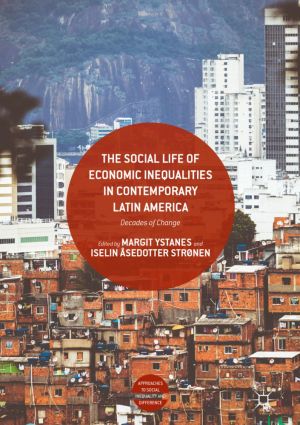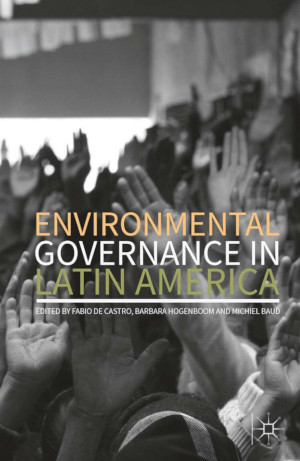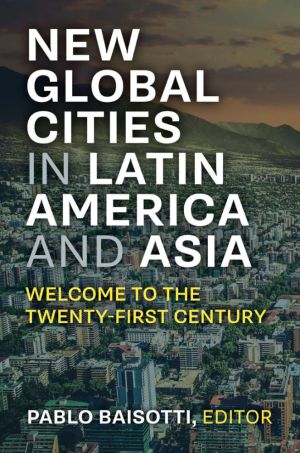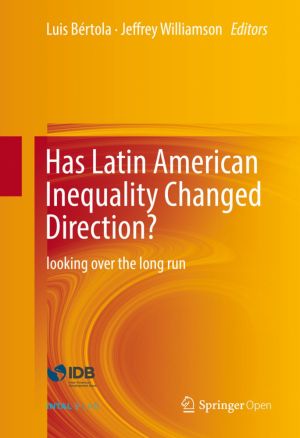Has Latin American Inequality Changed Direction?
Looking Over the Long Run
by Luis Bértola, Jeffrey Williamson
DescriptionDetailsHashtagsReport an issue
In this book, a group of global experts gathered by the Institute for the Integration of Latin America and the Caribbean (INTAL), part of the Inter-American Development Bank (IDB), show readers how various types of inequality, such as economical, educational, racial and gender inequality have been practiced in countries like Brazil, Bolivia, Chile, Mexico and many others through the centuries.
Presenting new ideas, new evidence, and new methods, the book subsequently analyzes how to move forward with second-generation reforms that lay the foundations for more egalitarian societies. As such, it offers a valuable and insightful guide for development economists, historians and Latin American specialists alike, as well as students, educators, policymakers and all citizens with an interest in development, inequality and the Latin American region. 






Book Description
This book brings together a range of ideas and theories to arrive at a deeper understanding of inequality in Latin America and its complex realities. To so, it addresses questions such as: What are the origins of inequality in Latin America? How can we create societies that are more equal in terms of income distribution, gender equality and opportunities? How can we remedy the social divide that is making Latin America one of the most unequal regions on earth? What are the roles played by market forces, institutions and ideology in terms of inequality?In this book, a group of global experts gathered by the Institute for the Integration of Latin America and the Caribbean (INTAL), part of the Inter-American Development Bank (IDB), show readers how various types of inequality, such as economical, educational, racial and gender inequality have been practiced in countries like Brazil, Bolivia, Chile, Mexico and many others through the centuries.
Presenting new ideas, new evidence, and new methods, the book subsequently analyzes how to move forward with second-generation reforms that lay the foundations for more egalitarian societies. As such, it offers a valuable and insightful guide for development economists, historians and Latin American specialists alike, as well as students, educators, policymakers and all citizens with an interest in development, inequality and the Latin American region.
This open book is licensed under a Creative Commons License (CC BY). You can download Has Latin American Inequality Changed Direction? ebook for free in PDF format (9.6 MB).
Book Details
Title
Has Latin American Inequality Changed Direction?
Subject
Economics and Finance
Publisher
Springer
Published
2017
Pages
419
Edition
1
Language
English
ISBN13
9783319446202
ISBN10
3319446207
ISBN13 Digital
9783319446219
ISBN10 Digital
3319446215
PDF Size
9.6 MB
License

Related Books

This edited volume examines how economic processes have worked upon social lives and social realities in Latin America during the past decades. Through tracing the effects of the neoliberal epoch into the era of the so-called pink tide, the book seeks to understand to what extent the turn to the left at the start of the millennium managed to challe...

This open access report presents findings from the five Latin American countries that participated in the second cycle of the IEA International Civic and Citizenship Education Study (ICCS 2016). ICCS 2016 investigated the ways in which a range of countries are preparing their young people to undertake their roles as citizens during the second decad...

The multiple purposes of nature - livelihood for communities, revenues for states, commodities for companies, and biodiversity for conservationists - have turned environmental governance in Latin America into a highly contested arena. In such a resource-rich region, unequal power relations, conflicting priorities, and trade-offs among multiple goal...

Cyborgs in Latin America explores the ways cultural expression in Latin America has grappled with the changing relationships between technology and human identity. The book takes a literary and cultural studies approach in examining narrative, film and advertising campaigns from Argentina, Bolivia, Chile, Mexico and Uruguay by such artists as Ricar...

New Global Cities in Latin America and Asia: Welcome to the Twenty-First Century proposes new visions of global cities and regions historically considered "secondary" in the international context. The arguments are not only based on material progress made by these metropolises, but also on the growing social difficulties experienced (e.g....

This book outlines development theory and practice overtime as well as critically interrogates the "cultural turn" in development policy in Latin American indigenous communities, specifically, in Guatemala, Honduras, Ecuador, and Bolivia. It becomes apparent that culturally sustainable development is both a new and old idea, which is simu...

